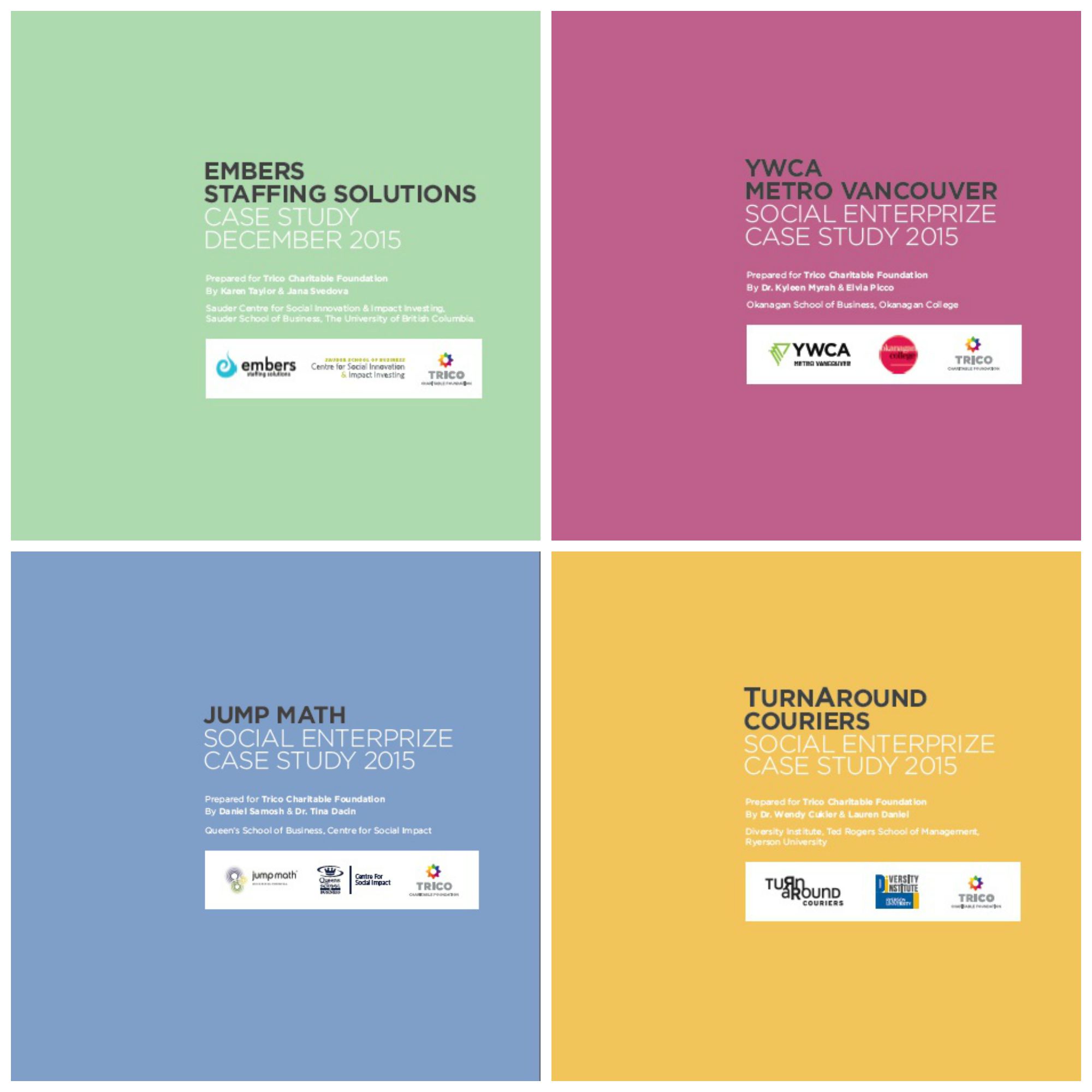This article was originally published on February 5th, 2016 on the SiG website. It has been cross-posted with permission from the author Kelsey Spitz, Senior Associate at SiG National.
“The truth about stories is that that’s all we are…” ― Thomas King, The Truth About Stories (2003)
In 2015, the Trico Charitable Foundation published four extensive case studies on the 2013 Social EnterPrize winners. Each case study was developed in partnership with the winning social enterprise and a post-secondary institution, converging the rigor of frontline experiential learning with the rigor of a critical academic lens.
The result? “A series of social entrepreneurship case studies that, in terms of the breadth of the organizations studied and the depth of the analysis, is the first of its kind in Canada” (Trico Charitable Foundation, April 2015). Together, each social enterprise and academic team revealed and codified key insights, challenges and lessons from these four thriving social enterprises.
“Storytelling is one of the most powerful forces in humanity. As a private foundation, we have learned that our work is better when we tell stories and when we listen to them.” ― Trico Charitable Foundation, April 2015
It is clear that an appreciation of the power of stories spurred Trico’s interest in developing the case studies. Why are stories so powerful? An audacious question, but one that provokes serious consideration of the role of stories in our lives.
In the context of social innovation, the defining stories we tell each day reveal our core beliefs and the conditioning beliefs of our broader social system.They tell us something about what we value, who we value, and what purpose we believe our systems (and selves) exist to serve.
In sharing – in depth – the story of the four Social EnterPrize winners, Trico Charitable Foundation contributed to a narrative that values business as more than a vehicle for profit maximization. ‘Social entrepreneurship’ is a story of sustainable social processes leveraging market solutions to serve social purpose. It advances another, broader story about our economic system, one where the economy thrives as products, services, and experiences put the best of our capital (financial, human, knowledge) sustainably to work producing (and reproducing) positive social and ecological outcomes.

The story of a new economy
Each case study offers a window into how this new story is taking root and reshaping economic life. Each case exemplifies business models succeeding not in spite of their social process and purpose, but because of it. And, to explain this success, each case brings to light that the triple bottom line of social enterprise (or social purpose business) is more than people, planet and profit – it is also process, purpose and outcome.
This is the triumvirate of a new economy where, similar to the case studies in the recently released book Citizen-led Innovation for a New Economy, “organized citizens are forging innovation, prying open cracks in the prevailing economic system and seizing opportunities to redirect economic life” (From the book blurb – Purchase the book here or the PDF summaries of the cases).
Stories describe where we come from and why we exist. They define ‘the good life,’ our expected roles in the society or how we should relate to each other. Stories tell us what our essence is: good or evil or somewhere in between; independent or interdependent; fundamentally threatened or enriched by difference. Above all, stories reflect and influence our perception of the world and, in doing so, our actions.
“A fundamental sociological premise is Thomas theorem: what is perceived as real is real in its consequences. We would add: how we think about and understand the world frames our actions. Indeed, we can be even more basic: whether we think about things matter.” ― Frances Westley, Brenda Zimmerman, Michael Patton, Getting to Maybe: How the World Is Changed (2006)
Each Social EnterPrize winner understood that “whether we think about things matters.” Whether we think about the potential of low-income folks living in Vancouver’s Downtown Eastside (EMBERS); the common need for safety and comfort by travellers, students, women in crisis, families in transition or with medical issues, seniors and refugees (YWCA Hotel/Residence); the untapped work ethic of job-ready, at-risk youth (TurnAround Couriers); or the pedagogical opportunity to empower every student to be a math prodigy (JUMP), it is actually noticing and thinking about these things that shapes our understanding of the world, frames our actions and, through our actions, reimagines our communities.
How do we follow in these footsteps? Thankfully, the case studies not only exemplify how these social entrepreneurs advanced a different perception of the world – and in doing so, ignited cascading opportunities – each also reveals how that acute perception translated into tangible insights, challenges, solutions and outcomes. They lend evidence and advice to others seeking to leverage a new worldview and market opportunity to achieve sustainable, measurable social and ecological outcomes.

Final takeaway
The ability to unlock market solutions that successfully redeploy capital to achieve transformational social and ecological impact often demands challenging the prevailing beliefs of our day. It butts up against the way so many people currently see or understand the world. The Social EnterPrize case studies remind us to know intimately the story we are telling through our actions and through our words…by whom, about whom, for whom, to what end. This story is our compass. As are these case studies which, with practical and inspirational insight, reveal how process and purpose can converge to power a new economy for social and ecological impact.
“The world changes according to the way people see it, and if you can alter, even by a millimeter, the way people look at reality, then you can change the world
— James Baldwin

